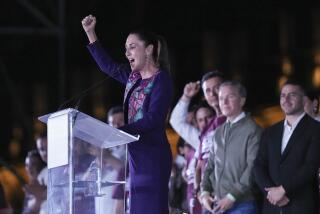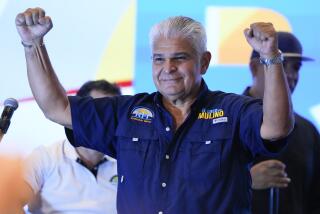Ex-Radical Takes Over Today as Bolivia Leader
- Share via
LA PAZ, Bolivia — Jaime Paz Zamora has been a candidate for the priesthood, a professional soccer player, a sociology professor, a Marxist radical and a political exile. Now 50, he is a moderate leftist and the next president of Bolivia.
With right-wing support, Paz Zamora won a presidential runoff vote in Congress early Saturday and will be inaugurated today.
The task he has set for himself is formidable: to launch South America’s poorest country on a firm course of social and economic development.
He has promised to do it without disrupting the country’s current financial stability or making any “traumatic change” in economic policy. These are pledges that some Bolivians regard with skepticism.
Paz Zamora was vice president from 1982 through 1984 in a left-wing coalition government that left the economy in shambles, with an inflation rate of more than 20,000% a year.
Recalling that period, Bolivians withdrew millions of dollars from savings accounts last week after Paz Zamora’s victory became apparent.
Congressman Guillermo Bedregal asserts that the new president is short on economic expertise and administrative skill.
But Bedregal, a former foreign minister whose centrist party leaves power today, said he trusts in Paz Zamora’s sincerity.
“He is a man of very good faith,” he said. “I believe he is a good democrat.”
The son of an army general, Paz Zamora graduated from a Roman Catholic high school in Bolivia and a seminary in neighboring Argentina. He dropped out of the seminary months before he was scheduled to be ordained a priest.
Later, he received a degree in social sciences from Louvain University in Belgium.
In 1970, when Paz Zamora was teaching sociology at San Andres University in La Paz, his younger brother was marching in a Marxist guerrilla group.
“Jaime tried to convince him it was crazy,” recalls Carmen Pereira, Paz Zamora’s former wife. The army pinned down the guerrillas in a mountain area north of La Paz, and 63 of the 75 rebels died. Some were shot, but Paz Zamora’s brother and many others died of hunger and fatigue.
Hugo Banzer, then an army colonel, seized power in a 1971 coup and immediately began a campaign of repression against Marxists. A group of them, including Paz Zamora, formed the Movement of the Revolutionary Left to resist the dictatorship.
Called the MIR, the movement was organized in clandestine cells. It distributed anti-government pamphlets, held student meetings and promoted strikes by workers.
Its ideology was Marxist-Leninist, but it did not advocate armed struggle.
Authorities captured Paz Zamora in 1974, and he spent three months in jail before escaping during the confusion of a coup attempt against Banzer. After two years in exile, the rebel returned secretly to Bolivia in late 1976.
It was then that Paz Zamora began leading the MIR away from its conventional Marxism to a more moderate leftist philosophy.
The MIR joined forces with veteran politician Hernan Siles Zuazo, a non-Marxist leftist, to contest elections called by Banzer in 1978. The electoral process was thwarted by fraud and a coup.
Paz Zamora was Siles Zuazo’s vice presidential running mate for new elections in 1979 and 1980, but those votes also led to confusion and coups.
Before the 1980 election, Paz Zamora was aboard a small campaign plane that crashed unexplainedly after taking off from La Paz. He was the only survivor but was badly burned; he still bears scars on his face and hands.
In 1982, Siles Zuazo and Paz Zamora were inaugurated on the basis of their 31% plurality in the 1980 elections. The MIR now emphasizes that as vice president, Paz Zamora had no responsibility for the economic turmoil during that administration.
Paz Zamora took third place again in this year’s popular election on May 7 with 20% of the votes. His runoff victory Saturday resulted from an 11th-hour alliance with Banzer and his conservative party, Nationalist Democratic Action.
In return for its support, Banzer’s party will get at least half of the Cabinet posts in Paz Zamora’s administration.
More to Read
Sign up for Essential California
The most important California stories and recommendations in your inbox every morning.
You may occasionally receive promotional content from the Los Angeles Times.













